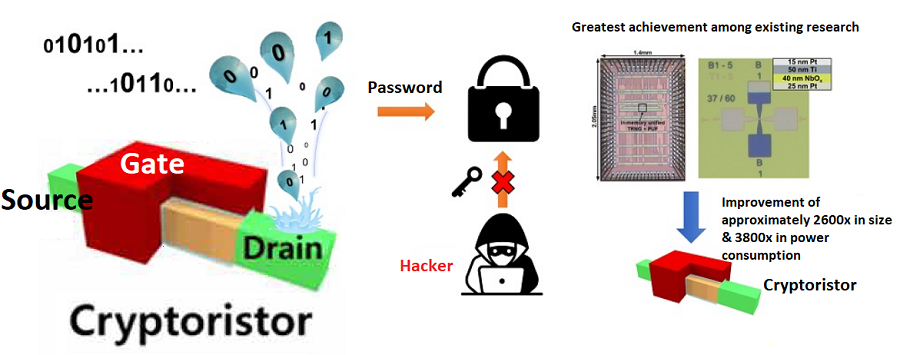Hacking attacks are becoming more complex due to the significant rise of information shared between components or devices in the 5G/6G era, such as for the Internet of Things (IoT) and autonomous driving. Therefore, improving security features is crucial for sending data safely between and among devices.
 Conceptual diagram of the security cryptographic transistor device. Image Credit: Korea Advanced Institute of Science & Technology
Conceptual diagram of the security cryptographic transistor device. Image Credit: Korea Advanced Institute of Science & Technology
The world’s first security cryptographic semiconductor was successfully developed, according to a KAIST research team led by Professors Yang-gyu Choi and Seung-tak Ryu from the School of Electrical Engineering, and they made the announcement on February 29th, 2023.
The group has created the world's first cryptographic transistor, the Cryptoristor, which is based on FinFET technology and is manufactured using a method that is 100% silicon-compatible. Cryptoristor is an unmatched random number generator (RNG) with a special design that consists of a single transistor and a specific mechanism.
The RNG is the most important component in all security environments, including artificial intelligence. The RNG is a key component of the most widely used security chip, the Advanced Encryption Standard (AES), accounting for over 85% of its energy usage and around 75% of the chip’s total size. Therefore, the development of ultra-small/low-power RNGs appropriate for mobile or Internet of Things devices is urgently needed.
Due to their incompatibility with silicon CMOS technologies and the huge surface area of circuit-based RNGs, existing RNGs have some restrictions.
As opposed to the existing chips, the team’s recently created Cryptoristor, a cryptographic semiconductor with a single-component structure, uses less than .001 of the power and takes up less space. The researchers created an RNG that randomly generates zeroes and ones by using the intrinsic unpredictability of FinFETs, which are built on a Silicon-on-Insulator (SOI) substrate with an insulating layer produced beneath the silicon.
In general, it is critical to stop hackers from predicting the encryption algorithms used in data transfers via mobile devices. As a result, this technique guarantees unpredictability by producing randomized, constantly-changing sequences of ones and zeros.
Furthermore, the cryptoristor-based RNG study has the same transistor structure as current logic or memory components, and it is the first of its type in the world without any worldwide implementation scenarios. This makes 100% manufacturing possible using inexpensive, quick mass-production methods that make use of already-existing semiconductor facilities.
As a cryptographic semiconductor, the ultra-small/low-power random number generator enhances security through its distinctive unpredictability, supporting safe hyperconnectivity with secure transmissions between chips or devices. Particularly, compared to previous research, it offers excellent advantages in terms of energy consumption, integration density, and cost, making it suitable for IoT device environments.
Seung-il Kim, Study Lead and Ph.D. Student, Korea Advanced Institute of Science & Technology
Hyung-jin Yoo, a master’s student, co-authored this study, which was formally published in February 2024 in the Science Advances online journal, a sister publication of Science.
Next-Generation Intelligent Semiconductor Technology Development Project and the Core Technology Development Project for the National Semiconductor Research Laboratory provided support for this study.
Journal Reference:
Kim, S.-I., et. al. (2024) Cryptographic transistor for true random number generator with low power consumption. Science Advances. doi:10.1126/sciadv.adk6042